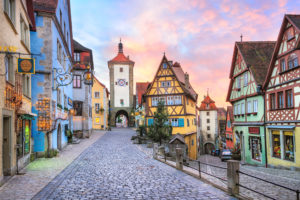
The Mullins’ family roots are almost all English and Scottish. But one branch of the family immigrated to the U.S. from Frankenthal, Bavaria (today’s southwest Germany), from an area known as the Rhenish Palatinate, on the west coast of the Rhine.
George Freyschlag and his wife, Suzanne Fittig, were born in the former district of Frankenthal—a small town on the Eckbach river. George was from Sandhoffen and Suzanne was from Grosskarlbach. The couple would marry and have their first 6 children here. Edward Freyschlag was their third child.
In 1821, they moved to Mannheim in order to secure a better education for their children. George was a farmer, a millwright, and a distiller of whiskey. He and Suzanne had 13 children in total—all born in Germany; although, at least 3 did not live to adulthood.
Emigrating To America
In 1832, George (47) and Suzanne (41) decided to emigrate to the U.S. for unknown reasons. Often, emigrants relocated for economic reasons. However, family lore suggests that the Freyschalgs were relatively wealthy when they traveled to America and even shipped their piano along with Edward on his voyage across the Atlantic.
The family came to the United States in 3 stages:
- In 1833, George sailed from Le Havre to New York with his oldest daughter, Babette (Barbara), and son, Edward.
- The following spring, Edward traveled back to Germany, and the next eldest son, William Herman Freyschlag, came to Arkansas through New York.
- Finally, in 1835, Edward left Europe with his mother and 9 remaining siblings, sailing to New Orleans on Les Deux Soeurs, then up the Mississippi on the steamboat Veteran, to the White River, and on to Fayetteville. They arrived the evening of March 9, 1835, to what must have been a very emotional reunion with George, Babette, and Herman.
An Emerging Frontier
In those years, it was fairly common for German immigrants to the U.S. to move to the western frontier, as the Freyschlags did. In the spring of 1833, Fayetteville was a new town with just a few dozen families. It had been founded just 4 years earlier when the settlers signed a treaty with the Cherokee Indians, who agreed to leave the land and move further west. An emerging frontier town offered the best economic prospect for a new mill to be appreciated and patronized.
By 1840, Fayetteville had about 425 residents. The 1840 U.S. Census shows that broader Prairie Township had just over 2,000 residents, about 280 were enslaved Blacks. George and his sons constructed their mill about 6 miles northwest of Fayetteville, on Clear Creek. The mill continued in operation for many years and was the only one in Fayetteville that operated continuously through the Civil War.
Several members of the Freyschlag family, including George and Suzanne, were buried on the grounds of the mill, but their graves were lost with time.
U.S. Citizenship
One year after arriving, in December 1834, George Freyschlag applied for and was granted U.S. citizenship before the Honorable Thomas P. Eskridge in Fayetteville. A record of the hearing states that George was required to avow that,
“he hath never borne any hereditary title or been of any of the orders of nobility [in Europe], and that if any such should unexpectedly descend to him he doth absolutely and entirely renounce the same; that he hath never been heretofore proscribed or been legally convicted, of having joined the army of Great Britain during the late war.”
We can wonder how well George spoke English and how heavy a German accent he had.
Edward’s brother Hermann served in the Mexican-American War (1846-1848), under General Winfield Scott and traveled on a campaign into Mexico. The soldiers would sing “Green grow the rushes, oh…” from which the slang “Gringo” developed.
Sophia Sawyer Fayetteville Seminary For Girls
In Fayetteville, several of the Freyschlags worked at the Sophia Sawyer Fayetteville Seminary for Girls. Sophia Sawyer was an Indian activist who established her school for Cherokee girls in 1839, but the school quickly became popular among the white settler families as well and had the financial support of several influential Fayetteville residents, including Mullins’ relative Judge David Walker.
Arkansas was a rough place during the pre-Civil War days, famous for fatal knife and gunfights. Sophia Sawyer’s school was a welcome outpost of civilized culture. Sophia Freyschlag (named for Sophia Sawyer) and her mother, Lucy Hawkins Freyschlag, both attended the school as girls.
Hermenia Freyschlag was the Teacher of Vocal and Instrumental Music. Her brother, Herman, was a Dancing Master. Several other family members would participate frequently by playing the violin or other instruments; Edward played piano. Edward’s mother-in-law, Jane Walker Hawkins, boarded some of the girls who attended the school, including Flora Ridge, daughter of the renowned Cherokee Chief John Ridge, who was assassinated in 1839.
The Freyschlags were fairly controversial among the more staid parents and faculty of the Female Seminary. Sophia Sawyer’s embrace of the family probably drove off her assistant, Miss Ann James, who wrote extensively and unfavorably of the Freyschalgs in her memoir. They are described as fun-loving, urging the girls on dancing and music-making to the delight of the young women. They were a musical family and, at times, somewhat wild. Suzanne would entertain callers by playing operatic music on the piano, dressed scandalously in a sleeveless dress—even on Sundays!
A Musical Family
Ann James also described the Freyschlags as quite clever and multi-talented. With his sons, George built the Freyschlag mill of rough-hewn wood. He was also a farmer and a distiller of whiskey. Suzanne skillfully played “page after page” of operatic music at the piano. Miss James wrote that the Freyschlag girls were “the milliners, corset makers, dressmakers, old umbrella menders, in fact, did everything that would bring in money, even to assisting their father who was a distiller.”
There is family lore that the Freyschlags ran a music hall in Fayetteville, but to date, this anecdote is undocumented.
© 2013 W. Mullins
